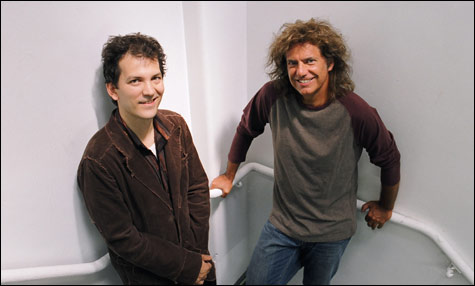
DE GUSTIBUS: Metheny found one of Mehldau’s pieces as difficult as Prokofiev; Mehldau praises Metheny’s “unyielding melodic line.”
|
Killer chops are part of what jazz is all about — what critic Whitney Balliett called “look-no-hands virtuosity.” So when a couple of virtuosos like Pat Metheny and Brad Mehldau get together, few would complain if they did little more than turn on the gas and burn. But in two recent CDs — last year’s Metheny Mehldau and the new Quartet (both Nonesuch) — what impresses is the variety of textures and forms. There are plenty of pedal-to-the-metal burners, but these aren’t just blowing sessions for long solos over blues and standards. Instead, the pieces open up from verse-chorus-verse simplicity to expansive forms, each with its own personality, from loose-waltz-time duets and romantic ballads to ambiguous, moody narratives that cut loose with stretches of driving rock beats.
“The quest for formal interest is something that’s pretty embedded in both Brad and me,” Metheny says when I get him on the phone from New York. “It would be pretty unlikely that either of us in any situation would show up with, like, little ‘heads.’ We sort of can’t help it.”
Metheny and Mehldau, who come to the Opera House next Saturday night in a quartet with bassist Larry Grenadier and drummer Jeff Ballard, spent six days in the studio in December 2005, a meeting the guitarist and pianist had been planning for years. Metheny: “By the time we got to the studio, between the two of us we had 24 tunes. And we arranged that Brad and I would play duo for a couple of days and then Larry and Jeff would come in for a couple of days. All 24 tunes got performed, and we had pretty good versions of every song.”
The 10-track, 66-minute Metheny Mehldau is mostly duo, with two quartet numbers; the 11-track, 73-minute Quartet includes four duets. Metheny: “Each track was like a record. Each was so individual in terms of requirements and style.” The sessions were never seen as one long double album, which Metheny says would have been too demanding on listeners. Instead, it was left to Nonesuch’s Bob Hurwitz to divvy them up. If you don’t want to miss a minute, though, Nonesuch will at the end of the year release the three-disc The Complete Metheny Mehldau Sessions, which will also include links to free downloads from the North American tour.
The two players make good complements. Metheny combines surface accessibility — sweet, folk-like melodies, organic solos that build in clear linear arcs — with deep harmonic and rhythmic sophistication. It’s a deceptive simplicity that makes what should be a nice straightforward solo acoustic-guitar record like One Quiet Night (Warner Bros., 2003) so nuanced and probing. Mehldau, though also a romantic melodist, is drawn to complexity — odd meters, dense lattices of harmony. His work with his longstanding trio (Grenadier and Ballard, who replaced original drummer Jorge Rossy) can be ruminative, even meandering, but it’s always compelling.
“He has enormous patience as an improviser,” Metheny explains. “He’s really willing to wait it out.” Early in his own career, Metheny was interested in conveying the spacious landscape of his native Missouri, and over the years, he continues, he “tried to fill up every inch of the canvas in various ways. With Brad, there’s plenty of room in his approach for both space and density.”
So, there are places on the CDs where each musician “comps” with chords behind the other’s solos, but there are also places where a clear, lyrical melodic line (as in Mehldau’s “Annie’s Bittersweet Cake”) gives way to giddy, up-tempo simultaneous improvisations, only Mehldau’s left hand alluding to the beat as lines and chords extend and overlap in a transparent web and the form disappears beneath them.
But you can always feel the form, even if you can’t parse it. Mehldau’s “Legend” begins with Metheny placing broadly spaced crystalline electric-guitar notes over gently pedaling oom-pah piano. Mehldau shifts into swing rhythm and Metheny comes in with the main theme, the pedaling returns, and then a more insistent figure from Mehldau. Another theme comes into play, then another. After a Mehldau solo, the two players come together for a unison figure over that now-insistent pedaling. The piece is at once calm and unsettled.
Elsewhere, a subtle key change with a shift in dynamics is all it takes to change the flavor of a piece. The Metheny Mehldau album closer, “Make Peace,” is Metheny at his folkiest, playing acoustic guitar over a two-part theme with Mehldau playing an answering bridge. But by the end, the simple folk ballad has worked up into some declamatory rhythmic playing — an imperative reading of the title — before settling down again.
Metheny identifies “Legend” as one of the “very difficult” Mehldau tunes. “It’s like playing Prokofiev or something — rhythmically and harmonically it’s very advanced. On the other hand, some of my tunes that are more simple, like ‘Make Peace’ — even though harmonically and melodically it’s pretty straightforward, the form comes from the emotional investment required to make it do what it’s supposed to do.”